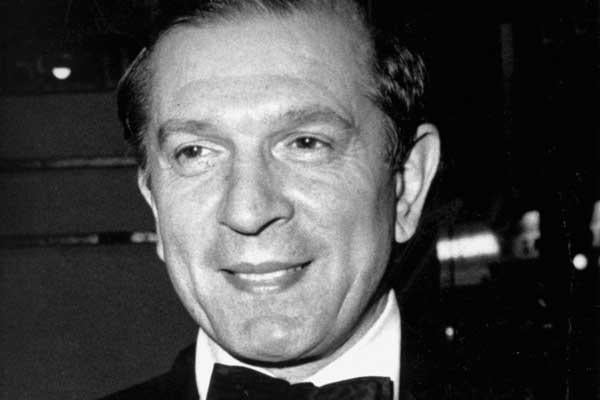
His critics called him vain, snobbish, jumped-up and vicious – all true – but Nigel Dempster was also generous (he felt uncomfortable if anyone else paid for lunch), charming (displaying exaggerated and affected old-world manners which made women blush with appreciation) and exceptionally funny (with a theatrical sense of timing when recounting a juicy anecdote).
But The Greatest Living Englishman (as Auberon Waugh only halfjokingly dubbed him when the two contributed to Private Eye) was an incredibly complex character.
Fellow mischief-maker Peter McKay believed he was so beset by his “demons” that it was a wonder Dempster could ever sleep. Actually, Nigel told me he rarely slept more than five hours a night – although he often had a post-lunch nap in the office.
As one who spent many years helping to craft his prose and accompanying him to endless parties, I would often ponder about what really made him tick, what motivated him to start each day with a blank sheet upon which a column of seven or eight stories would have to be created.
Of course he was able to call upon (and call literally from a phone provided by the Savoy/Foxtrot Oscar/ Langans/Greens or wherever he was when he didn’t feel like returning to the office) a team of the best story-chasing journalists to ever fill a newspaper diary.
Among those that researched and wrote his eponymous column every day were Helen Minsky (still there, still getting scoops, but now for Richard Kay), Clive Goodman (before he succumbed to red-top fever), Deborah Lawrenson (who became a best-selling novelist) and Janet King (now at the Western Morning News).
Each day it was earnestly subbed by Willy Bloch, a no-nonsense Scotsman who had once shared a flat with Gordon Brown. But it was always Nigel who could pull a scoop out of his back pocket when a lead story had fallen down and we had 15 minutes to go before our deadline.
I was a 23-year-old lad about town, trained on a Somerset newspaper, when I was first lured to Dempster’s lair in the Mail’s old HQ in Tudor Street by promises of lavish rewards for going out every night to the best parties, rounded off with a nightcap at Tramp or Annabel’s.
All I had to do was remember who I had spoken to the next day – and put names to Alan Davidson’s photographs before composing pithy paragraphs about Prince Andrew being introduced to the cleavage of Lady Miranda Fitz-Tightly.
It was fun – and he was fun, if a demanding and exacting taskmaster who made me memorise Debrett’s.
And whenever I made noises about expanding my experience on other newspapers, Dempster would astutely arrange for me to do a column from wherever I chose: Barbados, New York, Monte Carlo, Los Angeles – even the Isle of Wight (for Cowes Week).
So I ended up staying for years, the last eight as his deputy on the Mail and, later, for the Mail on Sunday.
It was never going to be easy to leave the employ of this mercurial figure and our parting proved messy, with my request to discuss a leaving date (I had already resigned to take up Dominic Lawson’s offer to edit Mandrake on the Sunday Telegraph)
being taken as a personal affront by Nigel – particularly as, unwisely, I had broached the subject just after he had returned from a three-hour lunch with racing chums in Mayfair – and he had just lost a fortune on the 3.30 at Kempton). Anyway, sharp words were traded and we ended up brawling on the floor outside his office, both of us having exchanged blows.
But the subsequent excitement of other papers about my split lip (particularly from the Mirror, whose editor Piers Morgan had been waiting for an opportunity to pay Nigel back for some perceived slight) surprised both of us – and was something we laughed about a great deal later. Nigel’s letter of apology, which he hand delivered to my home two days later, was genuinely touching and, despite being encouraged to sue for assault by Mohamed Al Fayed (who offered to pay all my legal costs) I had no wish to give Nigel’s enemies any more ammunition to get at him.
Perhaps the greatest clue of what really motivated Nigel (apart from the salary – then one of the highest paid by the Mail – which he blew on the horses anyway) was when he once described himself as “society’s moral policeman” – a questionable position for him to assume, given his own fallibilities such as his aggression, bourgeois pettiness and his insistence on drinking and driving, even the short distance from Launceston Place back to the office after a lunch awash with Chablis or Macon Lugny.
But all that swaggering sure got him noticed. And he never forgot the name of a head waiter, doorman or a lowly security guard at Northcliffe House.
Not that he seemed to enjoy it much in the end. As he once complained to me – and to his later deputy, Tim Walker: “Nobody ever thanks you for doing a job like this. All you ever get are complaints.”
Adam Hellikeris diary editor of the Sunday Express
Email pged@pressgazette.co.uk to point out mistakes, provide story tips or send in a letter for publication on our "Letters Page" blog
